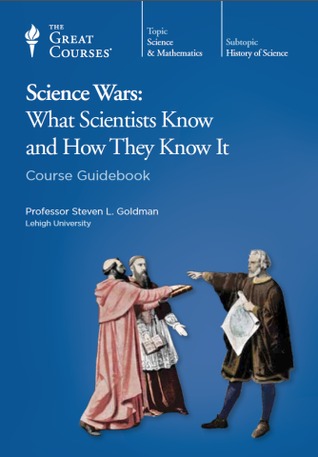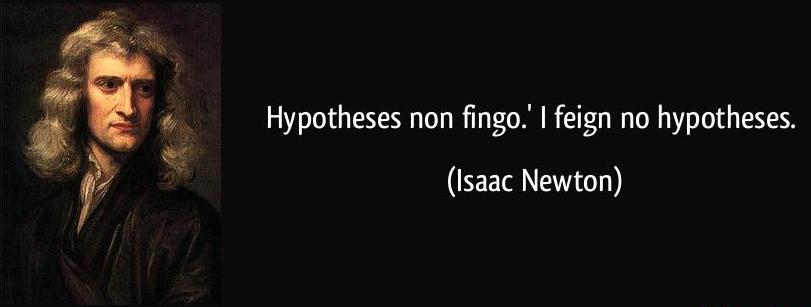|
home | what's new | other sites | contact | about |
|||
|
Word Gems exploring self-realization, sacred personhood, and full humanity
Professor Steven Goldman What Scientists Know Part II Editor's Summary
return to "Knowledge" main-page
Editor’s summary comments on Professor Goldman’s “Science Wars” Near the beginning of Professor Goldman’s guidebook to his lectures, he offers this remark: fundamental to the human condition “The endurance of this conflict [in science, and with humanity at large] strongly suggests that it is fundamental to the human condition and cannot be solved by dismissing one side or the other.” This debate and strife has been raging for thousands of years – why is that? The professor is assuredly correct. Longevity of contention speaks to something very deep in the oft-times darkened hearts of unenlightened humanity. As we learned from Dr. Goldman, the intellectual rancor here is more than jousting for acceptance of some new scientific theory. There's much more going on here than a science-fair award. the battle to define the nature of reality itself The battleground, more fundamentally, is for the allegiance of minds, the canvassing for support, of assigning private-agenda meaning to knowledge and truth, of the nature of veridical evidence, and of how these are to be approached. Moreover, in essence, we are witnessing a struggle to define the universe, life, and reality itself. ‘the games people play’ In these lectures, we’ve seen how people will obfuscate, will distract themselves and others, will deny and prevaricate, in an effort to hide from honest investigation of the truth. a proper review of this subject would impinge upon a great many topics addressed on the WG site Some of these would be: repression, clear thinking, intuition, consciousness, desire, creativity, belief, dualism, causation, deception and propaganda – but let’s stop here as it becomes obvious that so many of the major WG subjects, at least tangentially, speak to Dr. Goldman’s thesis. But what’s really going on in this endless debate going back at least to Plato 2400 years ago? In the “cultism” articles we learned that the root idea of this term is “to cut,” that is, to prune, fashion, shape, regulate. Virtually, every institution on planet Earth is engaged in various forms of cultism: it is the effort to mold and direct the minds of followers in an effort to gather power and control. The “Science Wars”, far from being immune from this tawdry process, represent some of the leading malefactors. There is vast influence, money, and prestige at stake in the formulation of scientific doctrine. Materialism still very much holds the upper hand, but better views are on the ascendency. What does the afterlife evidence tell us about this area of contention? On the “sensibility” page, we learned that 75% of those who cross over to the next worlds will spend at least some time in a dark place. Why is this so? The answer addresses the very essence of what it means to be human. As mentioned, most people on planet Earth are engaged in various forms of cultism – be it the corporate, political, religious, or some other Dear-Leader variety. And when one surrenders one’s autonomy to become a faithful follower-drone of any cultish program, a kind of darkness enters one’s mind. What does this really mean? It means many things, not the least of which, by implication, we learn that our time on planet Earth was meant to lead us into an honest, open, autonomous, and forward-thinking frame of mind; one that is ready to receive the truth. And if we pervert ourselves by “the games people play,” by shutting down critical-thinking faculties, by hiding from the truth, then, when we transition, we will find ourselves in a restricted, isolated dark world of mandated introspection. the enforced time-out: the mandated introspection And what does this mean? It's what we were supposed to be doing all along. This time-out suggests that we were meant to be thoughtful, open, and honest all during our Earth lives, and if we refuse to do this, then we, our own “higher selves” – not some mythical vengeful “sky-god” – will send us to “detention” that we might decide what will be our next step: rehabilitation or sinking into further darkness and misery? Much could be said here, but it’s already been said in 10,000 pages on the WG site. It is our “duty,” you might say, to discover one’s “true self” within. We have a duty to grow up, to mature, to develop our hearts and minds. As we do, and if we allow ourselves to be open, to surrender, to Universal Intelligence, we find ourselves taught, on an individual basis, concerning the nature of life, love, reality, and all good things. distorting reality to protect oneself The debate and struggle since Plato has not lessened because people are led by the “little-me” ego. It’s a dynamic within which, in its frantic illusions, believes itself to be “not enough.” In this frightening state of perpetual insufficiency, the ego will distort reality to protect itself. And this is why the debate has not gone away; it can’t go away when the hidden dysfunctional ego feels so threatened and beleaguered. chicken and egg In the plenary text, I asked, Which came first, the deductive chicken or the inductive egg? For many years, I wondered, How could the deduction method be correct? How can one begin with a solid truth when this is what we’re looking for? But then I learned of the creativity research, how so many of the great ideas in science and art were simply “received” by the researchers and artists. If one is a radical materialist, denying the impact and importance of intuition and consciousness, then, yes, one is likely to “go hungry” when it comes to receipt of the break-through advancements. But, we are meant to learn how to access the inner “true self.” And, when we do, we will be given insights from a source beyond ourselves. This is the sure basis for the deductive method. Induction is very important, as well. Further research, testing, and data-harvesting will serve to “flesh out” and expand upon initial glimpses of “the truth.” And so these two methods, deduction and induction, are not meant to be at loggerheads at all but naturally fit hand-in-glove to each other, one complementing the other. 'hypotheses non fingo' Isaac Newton (1643 - 1727) vigorously denied the validity of the deductive method. Essentially, he thought it was nonsense (because it was being misused), an antipathy expressed in his oft-quoted phrase, (Latin) “Hypotheses non fingo” – translated as, “I feign” or “contrive” or “construct no hypotheses”; that is, no hypotheses should be entertained unsupported by induction, a rigorous fact-gathering process. To do otherwise, he would assert, invites personal prejudice, private agendas, and hobby-horse riding.
A good deal of materialistic science, especially when it attempts to refute the evidence for the afterlife, falls under the category of "hyptheses non fingo." It's made up. There's nothing behind the assertion. The "many worlds" theory in quantum mechanics is a prime example.
this page is under construction
|
|||
|
|


